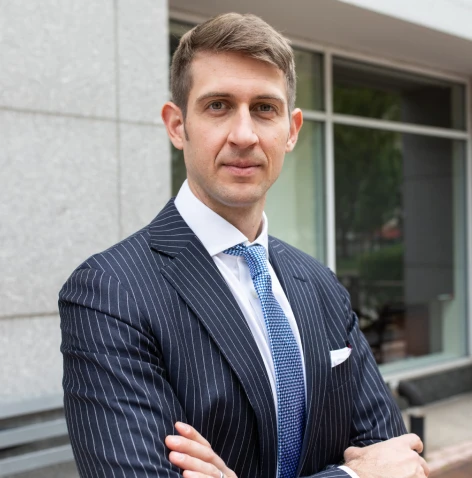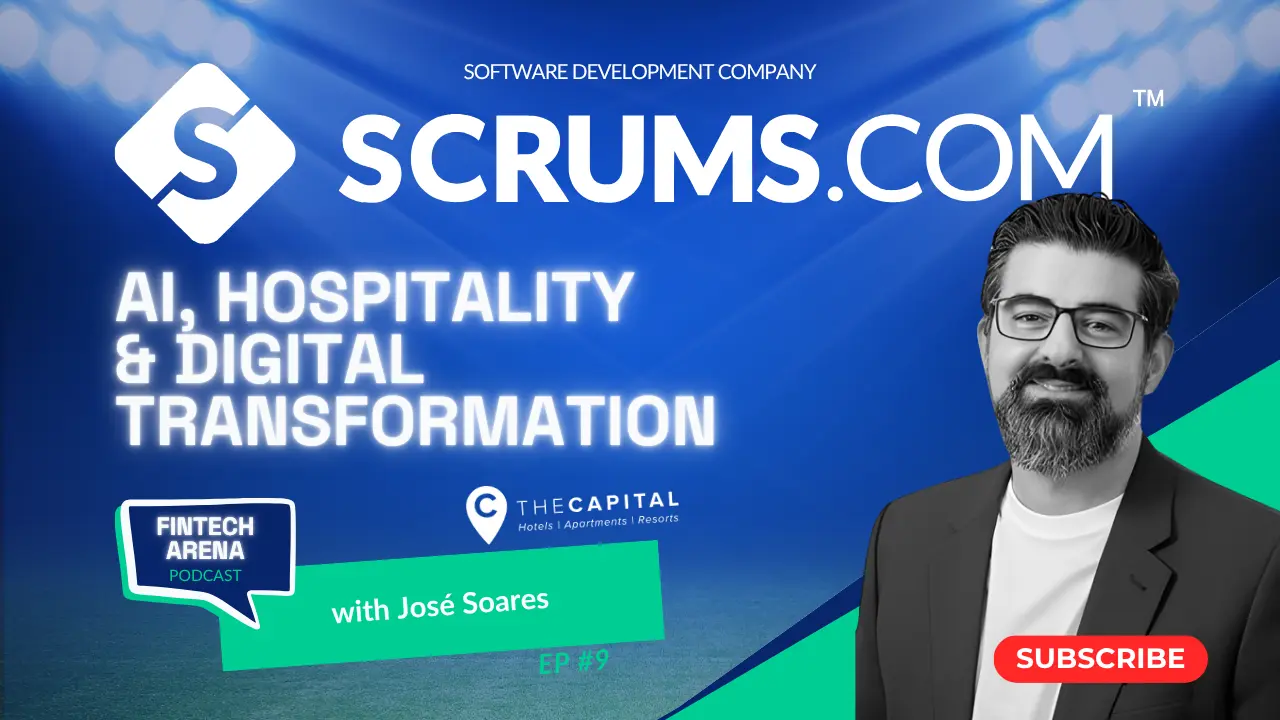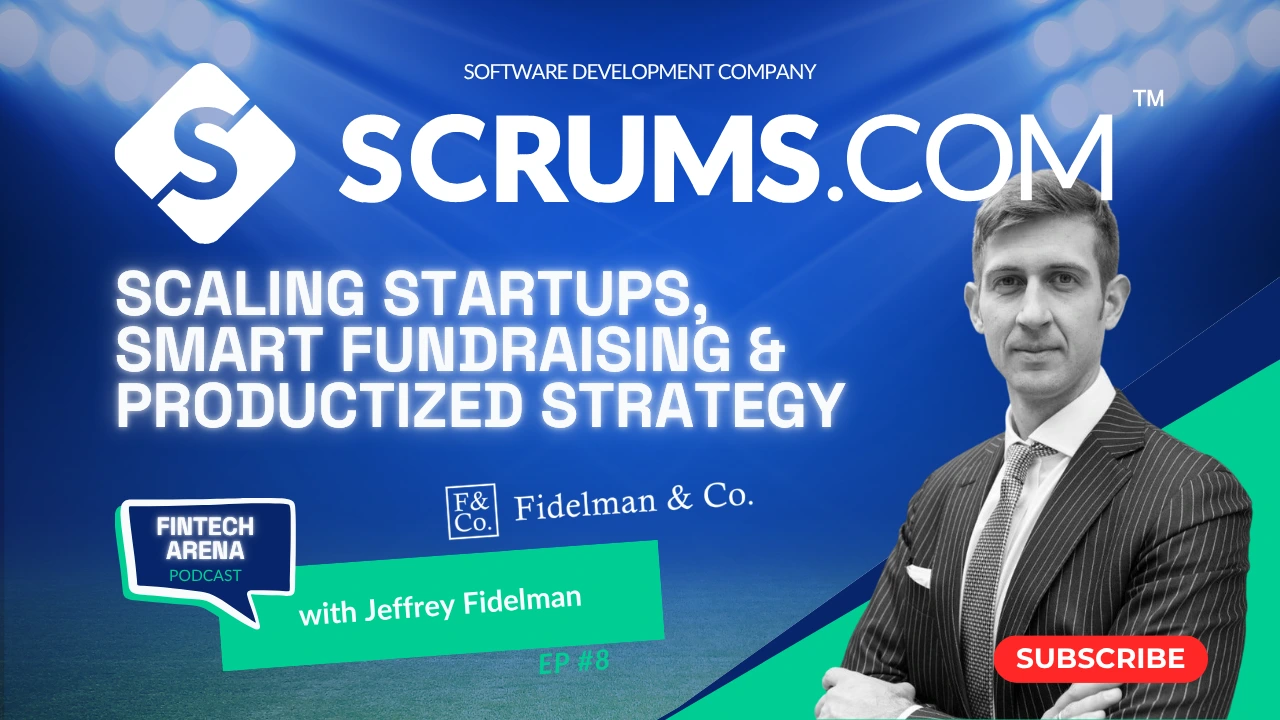🎧 Welcome to Scrums.com's Fintech Arena!
A podcast dedicated to Fintech leaders who want to stay ahead in the fast-evolving industry. In each 30-minute episode, we uncover actionable insights and strategies from top innovators in the world of finance and technology.
🎙 Episode Guest

Jeffrey Fidelman — Founder & Managing Director at Fidelman & Co.
Roles: Strategic advisor, interim CFO/COO, growth-stage capital expert
Expertise: Capital raising, financial modeling, VC/PE dynamics, startup infrastructure
Fun Fact: Jeff built his firm from the ground up after pivoting from roles at Morgan Stanley and HSBC—and used no-code tools to develop an MVP for his own productized fundraise platform.
🌟 Key Topics Covered
From Banking to Building
Jeffrey shares his journey from Wall Street to entrepreneurship, founding Fidelman & Co. to fill a vital gap in capital raising services for early to mid-stage companies. The firm has grown into a 40+ person remote team, offering "fundraising as a service" that blends custom strategy with productized delivery.
Rethinking Seed Investing
Today’s seed round often demands real revenue—even $1M ARR—reflecting a shift in investor expectations. Jeffrey explains how this new reality favors founders who can bootstrap to traction before seeking funding.
AI, Infra, and the Hype Cycle
AI may be the theme of the year, but Jeff warns against chasing trends. Instead, he champions investing in infrastructure that supports the boom—like data centers and computing capacity. His advice: build the rails, not just the train.
Founders’ Red Flags
Unrealistic financials and aggressive hiring plans can kill investor interest fast. Jeff shares what makes investors tune out—and what earns their trust: solid capital deployment, sensible growth, and clear paths to ROI.
Why Now is Still a Great Time to Start
Despite economic headwinds, tools like no-code platforms have lowered the barrier to entry. Jeff built an MVP himself using Lovable—showing how fast founders can go from idea to proof-of-concept, ready to raise or scale.
What Investors Want
Gone are the days of raising on hype alone. Today's investors seek fundamentals: scalable models, credible teams, and rational projections. “There are no silver bullets in fundraising,” Jeff says—just structure, persistence, and real business value.
The Productized Services Playbook
Jeff’s favorite book, Productize by Aisha Armstrong, outlines how service-based founders can scale beyond themselves. He breaks down his own journey from consulting to managed services to building a scalable tech product.
🚀 Key Lessons for Fintech Leaders
✅ Structure Wins: Fundraising isn’t magic—it’s process. Create a system, communicate consistently, and build relationships.
✅ Don’t Overpromise: Be realistic about revenue projections and how fast you can hire or scale.
✅ Build Infrastructure: Instead of chasing AI hype, think about the systems and power behind it.
✅ Fund the Founders: At the pre-seed/seed stage, investors back teams over ideas. Grit and follow-through win.
✅ From Service to Scale: Think beyond your expertise—create assets, not just jobs.
🎯 Actionable Takeaways
- Break into fundraising with structure, not hope. Know your capital strategy inside out.
- Present investors with a realistic plan: growth, ROI, and a sensible use of funds.
- Use AI and no-code tools to get to MVP faster and cheaper than ever.
- Avoid red flags: overblown forecasts, vague financials, and unscalable hiring plans.
- Think like an investor—show them how they’ll make money, not just what you’re building.
📖 Jeff’s Fintech Insight
"Eventually, the people who stick with it are the ones left standing. Keep the vision clear, stay consistent, and you’ll outlast the noise."
🔗 Stay ahead in fintech, fundraising, and digital innovation.
Visit Scrums.com for expert insights on Africa’s fintech and startup landscape.
📌 Chapters
00:00 – Welcome & Jeffrey’s Background in Finance
01:26 – From Morgan Stanley to Founding Fidelman & Co.
04:50 – Why Fundraising-as-a-Service Works
07:05 – State of Venture Capital in the U.S.
10:56 – The Rise of Pre-MVP Founders & Bootstrapping
12:04 – The AI Hype Cycle vs Real Opportunities
15:14 – Why Infrastructure is the Real Bet
16:59 – Is It Actually Harder to Raise Capital Today?
20:28 – Biggest Red Flags in Pitch Decks
23:40 – Favorite Book: Productize by Aisha Armstrong
🙌 Like what you heard?
Subscribe, share, and join us next time as we uncover more stories and strategies behind the world’s most influential tech leaders!
Chase Le Roux [00:09]
Welcome back to the FinTech Arena. I'm your host, Chase Le Roux, and I'm very excited to welcome you to today's ultimate podcast for FinTech leaders.
Today we're joined by Jeffrey Fidelman, the Founder and Managing Director of Fidelman & Co. They are the leading advisory firm, launched back in 2015, to address the critical fundraising and growth strategy needs of early to mid-stage companies. Under Jeffrey's leadership, the firm has scaled to a remote team of over 40 to support clients across capital raises, business sales, acquisitions, and strategic initiatives.
Jeff has deep experience as an interim CFO and COO and has successfully guided dozens of companies through pivotal financial transactions, helping them unlock growth, secure capital, and navigate complex market dynamics. He started his career in property, moved to Morgan Stanley, and has even served as Vice President at HSBC. He's also a Harvard University graduate and has built a reputation as a strategic operator, investor, and trusted advisor to both founders and management teams.
So Jeffrey, welcome and good to have you in the arena.
Jeffrey Fidelman [01:23]
Thank you. Thank you for the wonderful introduction as well.
Chase Le Roux [01:26]
Awesome. You've got some incredible accreditations and clearly had an incredible journey. As mentioned, working at businesses from Morgan Stanley to HSBC and then founding your own business all those years ago. For the listeners out there, Jeff, what was that "aha moment" that led you to starting your own advisory firm?
Jeffrey Fidelman [01:47]
Looking back on it 10 years ago, I can now say there was an aha moment. At the time, I don't know if there was, but it was more like falling backwards into something and then realizing, "Wow, this actually works and people need this type of service."
I spent the better part of a decade in banking, as you mentioned, between Morgan Stanley and HSBC. After that, I spent some time as a partner at a venture fund under a family office. The investment thesis was to invest in early-stage companies and then help the founders syndicate the rest of the capital out to the market. It became very clear that there was a gap between the institutional mindset of capital raising and how companies seeking venture capital raise money.
When we started the business about 10 years ago, we were simply a consulting firm helping clients put together their fundraising documentation: decks, models, valuation, capital structure—all of those pieces. At the end of our engagements, we would provide clients with a custom-tailored fundraising strategy book: who to call, the email copy to use, best practices for staying in touch. We told them, "Do this consistently and you will raise capital."
12 to 20 weeks later, most of our clients would come right back to us and say, "Jeff, this is great. Can you do it for us?" That's where another pivot in our business happened. We started helping companies raise capital in an atypical way we call "Fundraise as a Service," or outsourced investment relations. We've implemented best practices in a structured, productized way that's custom for each client.
We subscribed to all the annual investor lead sources—PitchBook, Preqin, etc.—aggregated that into a single database, and layered a workflow and an analyst on top of it who calls and emails on behalf of our clients. From the investor's perspective, it's the company reaching out directly, not a third party. That's what brought everything together, from helping companies create collateral to implementing the best practices that we've seen work time and time again.
Chase Le Roux [04:50]
Great. And Jeff, would you say the biggest difference between yourselves and the banks or VCs is your ability to work alongside them, as opposed to handing over the work? Would you say that's a key differentiator in creating that partnership?
Jeffrey Fidelman [05:12]
I would say it's certainly the largest one. If you look at institutional banking, the advisor relationship is different. You're working with a company that's making $50 or $100 million in revenue, so it's more about, "Hey, we know you're going to get funded. Let's just figure out who's going to do it."
At the earlier stage of the market, the dynamic is totally flipped. When a company goes to a typical advisor, that advisor’s actual relationship is often with the investor, not with the company paying the fees. A lot of these advisors will run through their Rolodex in a matter of two to four weeks and then start throwing spaghetti at the wall to see what sticks. The moment that happens is the moment the deal is essentially dead.
Chase Le Roux [06:37]
Great, thank you. That helped clarify it. I'm keen to get into the nitty-gritty here, Jeff. A lot has happened in the US over the last six months, and the entire VC space has seen a lot of change over the last five years. How would you describe the current state of venture capital and private equity in the US today?
Jeffrey Fidelman [07:05]
There's good and bad. I'll start with the bad and then end with the good.
The bad is that there's a lot of herd mentality. When you look at the valuations published in the media, it's very difficult to make sense of some of those numbers. One investment begets another, and you get this group mentality. It's similar to what came to light about Warren Buffett's deals; he would invest with preferred treatment, and then everyone would follow suit just because they heard he was investing. The later somebody came into that investment, the fewer returns they had to squeeze out. I see a lot of the same happening in venture.
The good is that capital is being deployed. Many funds raised in 2020-2022 are sitting on dry powder and need to start allocating. Also, the rate of innovation is incredible. It's probably never been a better time to start a business, especially in technology or software, than it is now. Getting to an MVP used to require significant technical knowledge or hiring someone who had it. Now, you can build it yourself with no-code tools.
We're building an internal platform, and we used a tool that cost a few hundred dollars and about 200 hours of my time. I was able to build the MVP myself and then take that product to developers and say, "Build this and commercialize it." I didn't need wireframes or UI/UX advisory; I had already thought through that. Before, companies would need to raise a few hundred thousand dollars just for an MVP. Now, it's very possible for companies to bootstrap it themselves.
Chase Le Roux [10:45]
And do you think this means the appetite for very early-stage deals has diminished in the funders' eyes?
Jeffrey Fidelman [10:56]
It's a bit of a pendulum. Nowadays, a seed investor will define themselves as looking for a million dollars in Annual Recurring Revenue (ARR), which blows my mind. When I first got exposed to venture, a seed investor was defined by seeding a company; very few, if any, were generating revenue. Now, it's a requirement.
On the other hand, I think there is a growing appetite for a return to seed by its original definition, or at least pre-seed investing. Because at the end of the day, you're looking at the founder and the management team. You're looking at what will happen when everything goes wrong, not just if everything goes right.
Chase Le Roux [12:12]
It almost feels like while giants like OpenAI are raising massive rounds, people are wondering what's left for the rest of the market. Is the expectation that you should be utilizing something like OpenAI, or are people still looking to invest in AI startups creating their own LLM models?
Jeffrey Fidelman [13:10]
I saw a chart the other day showing the "flavor of the year" for tech trends. What's funny is that not once over the past 10 years was the biggest unicorn to come out of that year actually related to the flavor of the year.
My own philosophy is that the most successful businesses are the ones that build the infrastructure to support whatever is the flavor of the year. AI is the flavor right now. Yes, you can place your bets on OpenAI or Anthropic, but what fundamentally needs to exist are data centers. No matter what AI company you invest in, they all need to use data centers, server racks, and advance those processes. If you're thinking about starting a business and see AI is the trend, perhaps it's a good idea to look into the infrastructure that fundamentally supports it.
Chase Le Roux [15:30]
That makes sense. You mentioned it's never been a better time to start a business, but the general sentiment out there feels like it's becoming more challenging to raise capital as time goes on.
First of all, am I correct in saying that? And secondly, if that is the case, is it because there's more competition, or because there's no cash and less appetite to invest?
Jeffrey Fidelman [16:59]
The short answer is no, I don't think it's harder now if you look at a cumulative historical average. Yes, the past two or three years have been exceptionally difficult. But the two or three years before that, money was flowing much more regularly. Taking the average, I think we're at a normal level.
Raising capital should not be super easy. The fundamentals are consistency, structure, creating a workflow, giving updates to investors, and building a relationship with them.
Fundamentally, if you have a unique idea and you stick with it, eventually you'll be one of the last people standing because everybody else will give up. I've seen this to be extremely true in my own business. After three or four years, 50% of the competition has fallen away. Another three or four years later, you're one of three people standing. When you're one of three, you're probably going to get funded or be successful.
Chase Le Roux [19:45]
That's some solid advice. When founders have put in the hard yards and stood the test of time, what are some of the most common red flags you see in pitch decks that immediately kill investor interest?
Jeffrey Fidelman [20:28]
The first two red flags are financial: capital deployment and revenue projections. Don't tell me you're going to make a billion dollars in year two. Control expectations. On the other side is the actual ask and the use of funds. If you say, "I need to hire 32 engineers in my first six months," an investor will think, "Yeah, right." Have you tried to hire one or two good engineers? It takes time. We always push our clients to be realistic about whether their deployment of capital is even possible.
Everything else falls into best practices. Fundamentally, make sure the investor can walk away knowing two things: what you do, and how they can make money. Everything else comes later in Q&A and diligence. An investor is a business, and they are in the business of getting more money back than they gave you.
Chase Le Roux [23:24]
Jeff, I can't believe it, we're almost at the end of our session. Quick-fire question: What's your favorite book and why?
Jeffrey Fidelman [23:40]
I keep going back to the same book called Productize. The first time I read it five or six years ago, I found it fascinating but not applicable to what I was doing. The book explains how to turn a service business into a managed service business, and then how to ultimately turn that into a product.
For us, it was interesting because we started as a consulting firm, turned it into a managed "Fundraise as a Service" business, and now we're building a product to productize the actual process for clients. I think that book is incredible, especially for founders in any type of services business. The biggest problem with a service business is that it's based on you—your name, your knowledge. If you're trying to build a scalable asset instead of a job, you need to productize your service.
Chase Le Roux [25:00]
Brilliant, Jeff. Thank you so much. Unfortunately, we have to call it short, but there's absolutely merit for a follow-up chat. Thank you for sharing your time and expertise. To the listener, if you're interested in finding out more, please head over to Fidelman.co and reach out to Jeff and his team.
And to the listener, thank you for tuning in. If you found today's conversation valuable, subscribe to our podcast and join us next time as we continue to uncover the stories and strategies behind the world's most influential FinTech leaders. Until then, keep innovating. Cheers. Thanks, Jeff.
Jeffrey Fidelman [25:48]
Thank you.
Watch More From Industry Experts
Explore more recently published podcasts from our collection.
The Right Approach to Custom Software
We deliver end-to-end software solutions, taking your idea from concept to a secure, scalable product that's aligned with your business goals.
Custom Software Development
Build custom, scalable software tailored to your business needs. Our expert team delivers robust, high-performance solutions using cutting-edge back-end technology.
Mobile App Development
From intuitive UI/UX design to app store deployment. We offer comprehensive mobile app development for iOS and Android, focusing on high-performance and streamlined operations.
Scrums.com Dedicated
Build a custom team that works exclusively on your project. We handle the infrastructure and logistics, so you can focus on controlling the team composition and integrating them seamlessly into your existing processes.
Scrums.com PDaaS
Get turnkey agile teams that deliver production-ready products. We're ideal for building new features or products without a specific tech stack preference, providing a cost-efficient, scalable, and results-driven solution.




